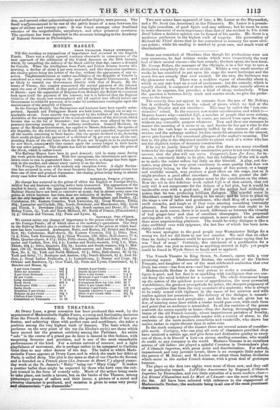Some one remarked of Sheridan, that though his productions were
not very numerous, he had written works which were respectively the very best of their several classes—the best comedy, the best opera, the best farce.
Mr. George Bolton, the manager of the Olympic, is in a fair way to earn a. distinction completely the reverse of this. Within a very small number of weeks he has contrived to put upon his stage the worst burlesque and the
worst five-act comedy that ever existed. Of the two, the burlesque was the pleasanter work. There was a reckless vigour of absurdity about it, which at any rate kept up a sort of excitement: but the comedy, which is equally absurd, is composed of mere feeble twaddle, that scarcely allows a laugh at its expense, but provokes a kind of sleepy melancholy. When the question is between lively trash and sombre trash, we give the prefer- ence to the former.
The comedy does not appear to emanate from the pen of Mr. Bolton; but it evidently belongs to the school of pieces which we find at the.
Olympic Theatre and not elsewhere. This may be called the " non-con- structive" school. In the concern now under consideration, and which is— Heaven knows why—entitled Life, a number of people that seem serious, and others apparently meant to be comic, are turned loose upon the stage, without any ostensible purpose whatever. Now and then one manages to master the meaning of a scene or so, and fancies he has got a clue to the rest; but the vain hope is completely baffled by the absence of all con- nexion, and the unhappy auditor, let him strain his attention to the utmost, never gets beyond a few occasional glimpses of the author's meaning. The fact is, the play is the disjointed tumble-to-pieces work of a writer who has not the slightest notion of dramatic construction.
_ If he try to justify himself by the plea that there are many excellent writers for the stage with whom the constructive power is not over strong, we
answer, that the plea will not serve. Congreve's Love for Love, for in- stance, is extremely faulty in its plot; but the brilliancy of the wit is such as to make the reader reflect but little on this blemish. A play, not dra- matic, may please by very great excellency in some quality that does not distinctively belong to the drama. A passage of fine poetry, or a happy and truthful remark, may produce a good effect on the stage, just as it might produce a good effect elsewhere. But then, the greater the defi-
ciency on the one hand, the greater most be the- excellence on the other. Now the wit in this delicious work called Life is of that nature, that not
only will it not compensate for the defects of a bad lot, but it would be
intolerable even with a good mu. And yeah° ant ci‘r .had evidently a
notion that be was producing brilliant dialogue. e -scandal scene in Sheridan's comedy has been floating in his miud; audit loves to place on the•stage a row of ladies and gentlemen, who shall fling off a quantity of swift remarks, and laugh as if they wore uttering something extremely pleasant. But between their jokes and the repartees that ought to be uttered in such scenes, there is as much difference as between the vivacity of bad ginger-beer and that of excellent champagne. The perpetual striving after wit, which is never attained, is more painful to the auditor than mere unpretending platitude. The would-be-witty dialogue is like a slate scribbled over with epigrams, the last line of which has been inva- riably rubbed out.
We must apologize to the good people near Westminster Bridge for a wrong we find we did them in our last number. We said that no other than an Astley's audience could be amused by a gentleman saying that he was "fond of soup." Certainly, this statement of a predilection for a peculiar diet was just as amusing as anything uttered in Life; yet people could be found in Wych Street to laugh and to applaud.


























 Previous page
Previous page